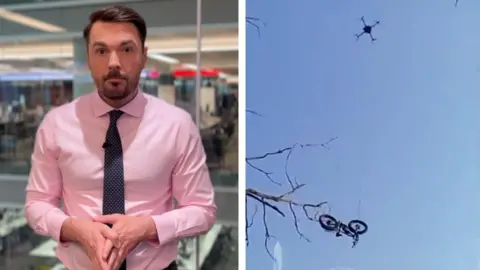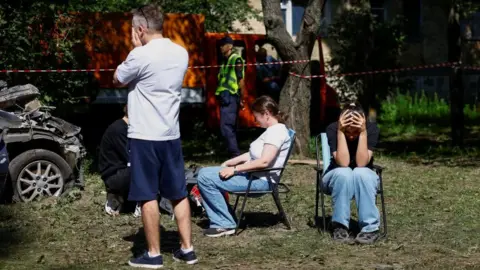Ukraine War Escape: Drones' Echo Never Left Them
The Unseen Predator: How a Tiny Buzz is Reshaping Warfare and Minds in Ukraine
Imagine a world where the hum of a lawnmower, the buzz of a fly, or the whir of an air conditioner sends shivers down your spine, triggering a primal fear you can't escape. For thousands of Ukrainians, this isn't a dystopian fantasy – it's their terrifying new reality. **Welcome to the age of droneophobia.**
This isn't just about explosions and shrapnel; it's about a relentless, high-pitched whine that hunts, harasses, and psychologically shatters. And it’s a sound that has burrowed deep into the minds of soldiers and civilians alike, long after the *actual* drones are gone.
***
When a "Pizza Box" Becomes a Nightmare
Just back from the brutal front lines, 30-year-old Pavlo, a seasoned drone operator, fumbled with a black case in his cramped Kyiv apartment. It was about the size of a pizza box, and inside rested a four-rotor drone – a seemingly innocuous device. He aimed to fly it around the room, a simple task. But his fingers pressed buttons, antenna adjusted, and nothing. "Sorry, not today," he chuckled, a forced smile masking something deeper. The unit looked fine, but a critical component was broken.
Yet, this small, broken machine symbolized a much larger, insidious threat Pavlo had just escaped.
On the front, Pavlo wasn't flying for sport. He was a pilot of **First-Person View (FPV) drones** – agile, camera-equipped quadcopters that have become the silent, deadly assassins of modern warfare. In just over a year, these small, bomb-laden FPVs have utterly transformed the conflict in Ukraine, eclipsing the heavy artillery that once defined its early stages.
 ***
The Relentless Hunter: "You Are Being Hunted"
These FPVs are not just weapons; they are relentless hunters. They chase armored vehicles through fields, stalk infantry units through dense treelines, and relentlessly pursue individual soldiers to their final, desperate moments. "You cannot hide from the FPV, and to run is useless," Pavlo recounted, his voice chillingly calm. "You try to be as calm as possible, and you pray."
Even when these aerial predators are too high to see, or concealed behind a canopy of leaves, their distinctive, high-pitched whine cuts through the air. "Bzzzzzzzzzz," Pavlo mimicked, a phantom sound still echoing in his ears. "You are being hunted."
***
The War That Followed Him Home
After more than a year enduring this auditory terror, Pavlo returned to his Kyiv apartment, hoping for peace. But the drones had followed him. Everyday mechanical sounds – the whir of a lawnmower, the rumble of a motorcycle, the distant hum of an air conditioner – now trigger a wave of panic. Even the natural world offers no escape; the buzz of bees and flies near him sends a creeping dread through his veins. "I don't like to go into nature anymore and hear this sound," he admitted, "because it reminds me so hard of the drones."
Pavlo isn't alone. This isn't just **PTSD**; it's a new, specific form of trauma born from the evolving landscape of conflict.
***
The Relentless Hunter: "You Are Being Hunted"
These FPVs are not just weapons; they are relentless hunters. They chase armored vehicles through fields, stalk infantry units through dense treelines, and relentlessly pursue individual soldiers to their final, desperate moments. "You cannot hide from the FPV, and to run is useless," Pavlo recounted, his voice chillingly calm. "You try to be as calm as possible, and you pray."
Even when these aerial predators are too high to see, or concealed behind a canopy of leaves, their distinctive, high-pitched whine cuts through the air. "Bzzzzzzzzzz," Pavlo mimicked, a phantom sound still echoing in his ears. "You are being hunted."
***
The War That Followed Him Home
After more than a year enduring this auditory terror, Pavlo returned to his Kyiv apartment, hoping for peace. But the drones had followed him. Everyday mechanical sounds – the whir of a lawnmower, the rumble of a motorcycle, the distant hum of an air conditioner – now trigger a wave of panic. Even the natural world offers no escape; the buzz of bees and flies near him sends a creeping dread through his veins. "I don't like to go into nature anymore and hear this sound," he admitted, "because it reminds me so hard of the drones."
Pavlo isn't alone. This isn't just **PTSD**; it's a new, specific form of trauma born from the evolving landscape of conflict.
 ***
Droneophobia: The New Face of Combat Trauma
"Over the past year, the majority of patients – if they are not physically wounded – have mental health injuries as a result of being under drone activity," states Dr. Serhii Andriichenko, chief psychiatrist at Kyiv's military hospital. "We call this **droneophobia**."
Thousands of soldiers are now returning from the front with acute stress disorders, their minds reprogrammed by the constant threat of **FPV drone attacks**. This invisible wound means that the most mundane urban sounds – the moped buzzing past, the air conditioner cooling a room, the neighbor’s lawnmower – can instantly transport them back to the hell of the front line.
Savur, another returned soldier who tragically lost an arm in an FPV drone attack, knows this all too well. "If it's a moped or a lawnmower, my first thought is that it might be a drone."
He remembers the front line as a place of "permanent sound." Unlike a shell, which lasts only seconds, "the sound of the drone is there most of the time. You can lay in your position, in your foxhole, and listen to it for hours. I remember that sound all of the time."
***
The Silence That Screams
***
Droneophobia: The New Face of Combat Trauma
"Over the past year, the majority of patients – if they are not physically wounded – have mental health injuries as a result of being under drone activity," states Dr. Serhii Andriichenko, chief psychiatrist at Kyiv's military hospital. "We call this **droneophobia**."
Thousands of soldiers are now returning from the front with acute stress disorders, their minds reprogrammed by the constant threat of **FPV drone attacks**. This invisible wound means that the most mundane urban sounds – the moped buzzing past, the air conditioner cooling a room, the neighbor’s lawnmower – can instantly transport them back to the hell of the front line.
Savur, another returned soldier who tragically lost an arm in an FPV drone attack, knows this all too well. "If it's a moped or a lawnmower, my first thought is that it might be a drone."
He remembers the front line as a place of "permanent sound." Unlike a shell, which lasts only seconds, "the sound of the drone is there most of the time. You can lay in your position, in your foxhole, and listen to it for hours. I remember that sound all of the time."
***
The Silence That Screams
 Sometimes, the horror isn't the sound, but its absence. "Silence is always the start," Dr. Andriichenko explained. "When the soldiers go on rotation to combat positions, they start listening carefully to make sure there are no drones. There is constant tension, constant fear. They are always looking up."
This hyper-vigilance often doesn't dissipate upon returning home. Soldiers have been observed instinctively switching off lights, moving away from windows, or even hiding under furniture. Often, they have no memory of a trigger sound, but a spouse will confirm that a fan or air conditioner had just been turned on.
In a grim twist, drone warfare has even reversed previous combat trauma patterns. Soldiers from earlier phases of the war, marked by brutal direct combat, often feared forests. Now, they "feel safest in forests, under dense tree canopies," the psychiatrist notes, as thick foliage can offer protection from drones. Yet, in their free time, they paradoxically *avoid* wooded areas, unable to shake the association with hidden threats.
***
The Ever-Expanding Danger Zone
The rise of **drone technology** has also extended the battlefield far beyond traditional front lines. Soldiers operating up to 40km away, or those finally rotating out after grueling weeks, can no longer let their guard down. The threat can appear anywhere, anytime.
Nazar Bokhii, a small drone unit commander, learned this devastating lesson firsthand. He was 5km from the contact line, safe in a dugout, when his unit scored a direct hit on a Russian mortar position 22km away. Buoyed by success, Bokhii bounded out, forgetting the cardinal rule: *always listen for the buzz*.
Mere meters away, a Russian FPV drone loitered. As it sped towards him, Nazar had only time to raise his arms. The detonation stole both his hands and his left eye, leaving his face severely burned.
Sometimes, the horror isn't the sound, but its absence. "Silence is always the start," Dr. Andriichenko explained. "When the soldiers go on rotation to combat positions, they start listening carefully to make sure there are no drones. There is constant tension, constant fear. They are always looking up."
This hyper-vigilance often doesn't dissipate upon returning home. Soldiers have been observed instinctively switching off lights, moving away from windows, or even hiding under furniture. Often, they have no memory of a trigger sound, but a spouse will confirm that a fan or air conditioner had just been turned on.
In a grim twist, drone warfare has even reversed previous combat trauma patterns. Soldiers from earlier phases of the war, marked by brutal direct combat, often feared forests. Now, they "feel safest in forests, under dense tree canopies," the psychiatrist notes, as thick foliage can offer protection from drones. Yet, in their free time, they paradoxically *avoid* wooded areas, unable to shake the association with hidden threats.
***
The Ever-Expanding Danger Zone
The rise of **drone technology** has also extended the battlefield far beyond traditional front lines. Soldiers operating up to 40km away, or those finally rotating out after grueling weeks, can no longer let their guard down. The threat can appear anywhere, anytime.
Nazar Bokhii, a small drone unit commander, learned this devastating lesson firsthand. He was 5km from the contact line, safe in a dugout, when his unit scored a direct hit on a Russian mortar position 22km away. Buoyed by success, Bokhii bounded out, forgetting the cardinal rule: *always listen for the buzz*.
Mere meters away, a Russian FPV drone loitered. As it sped towards him, Nazar had only time to raise his arms. The detonation stole both his hands and his left eye, leaving his face severely burned.
 Nazar’s own **PTSD** is limited to occasional fear responses to motorcycles and lawnmowers. But he intimately understood the psychological power of the drone's sound. Why? Because his unit had weaponized it.
***
Weaponizing the Whisper: A New Kind of Psychological Warfare
"We were the side that caused fear with sound, not the side that suffered from it," Bokhii revealed. His unit discovered that the drone's buzz could be used to force Russian soldiers out of cover. "You buzz around them and it becomes a test of the enemy's psychological resilience," he explained. "The sound of the drone itself is a serious psychological attack."
Hover a drone above a soldier long enough, Bokhii said, and even the most fortified shelter becomes unbearable. "Our psychology works in such a way that we need to do something to calm ourselves." So, under the constant psychological suppression of the buzzing, they run into the open terrain, becoming easier targets.
***
The Sound of Terror Reaches Civilians
The psychological terror of the FPV drone is no longer confined to the front lines or the areas immediately behind them. Russia has begun using these silent killers to drop munitions on civilians in Ukrainian cities, turning ordinary life into a daily gauntlet of fear.
Nazar’s own **PTSD** is limited to occasional fear responses to motorcycles and lawnmowers. But he intimately understood the psychological power of the drone's sound. Why? Because his unit had weaponized it.
***
Weaponizing the Whisper: A New Kind of Psychological Warfare
"We were the side that caused fear with sound, not the side that suffered from it," Bokhii revealed. His unit discovered that the drone's buzz could be used to force Russian soldiers out of cover. "You buzz around them and it becomes a test of the enemy's psychological resilience," he explained. "The sound of the drone itself is a serious psychological attack."
Hover a drone above a soldier long enough, Bokhii said, and even the most fortified shelter becomes unbearable. "Our psychology works in such a way that we need to do something to calm ourselves." So, under the constant psychological suppression of the buzzing, they run into the open terrain, becoming easier targets.
***
The Sound of Terror Reaches Civilians
The psychological terror of the FPV drone is no longer confined to the front lines or the areas immediately behind them. Russia has begun using these silent killers to drop munitions on civilians in Ukrainian cities, turning ordinary life into a daily gauntlet of fear.
 Kherson, a southern city brutally occupied by Russian forces and still within easy drone range, has been particularly devastated. Human Rights Watch reports that Russian forces have deliberately targeted civilians there with FPV drones, killing or maiming them – a horrific war crime. This year alone, at least 84 civilians in the Kherson region have been killed by these attacks.
"There is no such thing as a safe place anymore," said Dmytro Olifirenko, a 23-year-old border guard living in Kherson. "You always have to be alert, focused, and because of that, the body is constantly under stress."
In September, Olifirenko was waiting at a bus stop when he heard the all-too-familiar whine of a Russian drone. "We thought it would follow the bus, because they had been hunting civilian buses," he recounted. Instead, the drone dropped its munition directly onto the bus stop, showering him with shrapnel that lodged in his head, face, and leg. A bystander's video captured the drone's buzz, then Dmytro's screams as he bled onto the pavement.
Now, Dmytro hears the drones "constantly," whether they are actually there or not. "It hits your mental and psychological health hard," he said. "Even when you leave for Mykolaiv or another city, you are constantly trying to listen."
***
The Battlefield in the Mind
For civilians like Dmytro, **drone warfare** has twisted the ordinary sounds of urban life – cars, motorcycles, generators, lawnmowers, air conditioners – into a constant psychological gauntlet. Even as they face the very real physical danger of these aerial predators, they must also contend with the invisible war raging within their own minds.
For soldiers like Pavlo, returning from the front, the drones have forged a new and specific type of fear, one that grips them with an insidious strength. "You see the world as a battlefield," Pavlo concluded. "It can become a battlefield any second."
Kherson, a southern city brutally occupied by Russian forces and still within easy drone range, has been particularly devastated. Human Rights Watch reports that Russian forces have deliberately targeted civilians there with FPV drones, killing or maiming them – a horrific war crime. This year alone, at least 84 civilians in the Kherson region have been killed by these attacks.
"There is no such thing as a safe place anymore," said Dmytro Olifirenko, a 23-year-old border guard living in Kherson. "You always have to be alert, focused, and because of that, the body is constantly under stress."
In September, Olifirenko was waiting at a bus stop when he heard the all-too-familiar whine of a Russian drone. "We thought it would follow the bus, because they had been hunting civilian buses," he recounted. Instead, the drone dropped its munition directly onto the bus stop, showering him with shrapnel that lodged in his head, face, and leg. A bystander's video captured the drone's buzz, then Dmytro's screams as he bled onto the pavement.
Now, Dmytro hears the drones "constantly," whether they are actually there or not. "It hits your mental and psychological health hard," he said. "Even when you leave for Mykolaiv or another city, you are constantly trying to listen."
***
The Battlefield in the Mind
For civilians like Dmytro, **drone warfare** has twisted the ordinary sounds of urban life – cars, motorcycles, generators, lawnmowers, air conditioners – into a constant psychological gauntlet. Even as they face the very real physical danger of these aerial predators, they must also contend with the invisible war raging within their own minds.
For soldiers like Pavlo, returning from the front, the drones have forged a new and specific type of fear, one that grips them with an insidious strength. "You see the world as a battlefield," Pavlo concluded. "It can become a battlefield any second."
 And of all the triggers, the human sense that drones exploit so effectively – hearing – is the most treacherous. "When you see something, your brain can check it in a second, you can realize what it is very fast." But an unknown sound? That's different. "Your brain has been changed. You cannot ignore it, you must respond. Because at the frontline, it could save your life."
The war in Ukraine continues to evolve, but one thing is clear: the psychological scars left by the incessant buzz of **FPV drones** will echo through generations, a chilling reminder that the deadliest weapon isn't always seen, but heard. And how will societies ever truly heal when the sounds of peace become the loudest reminders of war?
And of all the triggers, the human sense that drones exploit so effectively – hearing – is the most treacherous. "When you see something, your brain can check it in a second, you can realize what it is very fast." But an unknown sound? That's different. "Your brain has been changed. You cannot ignore it, you must respond. Because at the frontline, it could save your life."
The war in Ukraine continues to evolve, but one thing is clear: the psychological scars left by the incessant buzz of **FPV drones** will echo through generations, a chilling reminder that the deadliest weapon isn't always seen, but heard. And how will societies ever truly heal when the sounds of peace become the loudest reminders of war?

Image 1

Image 2

Image 3

Image 4

Image 5

Image 6
Comments
Post a Comment